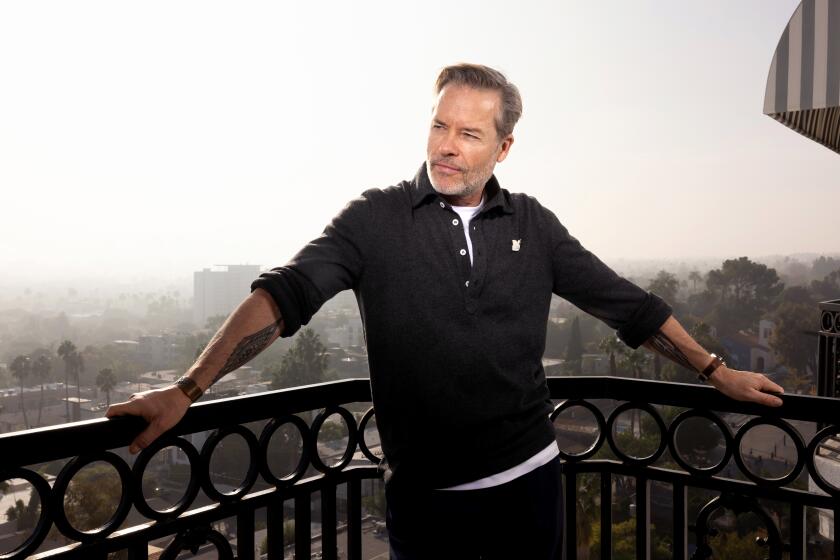Review: Michelle Williams and Julianne Moore face off in the melodramatic ‘After the Wedding’
- Share via
Handsome, earnest and reserved, despite a succession of soul-rattling character revelations, “After the Wedding” is the kind of well-appointed, morality-minded adult soap that once had pride of place throughout an earlier Hollywood era’s movie year. Now it’s sneaking in amid the whizbang tentpoles with its measured tones and big-theme professionalism, like someone in evening wear wandering an arcade hoping to lure someone away for an important talk.
It may have trouble, though, since writer-director Bart Freundlich’s American remake of Danish filmmaker Susanne Bier’s Oscar-nominated 2006 family drama is curiously bloodless, despite the enticing tweak of gender-reversing the primary roles and giving two of those parts to Michelle Williams and Julianne Moore (who is also married to Freundlich). Their performances are rock-solid embodiments of the original story’s major concerns — parenthood, regret, emotional tradeoffs — but the movie is still a discordant mix of elegance and potboiler, miles from the type of vivid, stylish melodrama director Douglas Sirk and cinematographer Russell Metty accomplished in the ‘50s.
Williams plays dedicated altruist Isabel (the Mads Mikkelsen role in Bier’s film), who at the beginning is a do-gooder struggling to keep her cash-strapped orphanage in India from collapsing. Hearing that a wealthy New York media mogul is ready to give $2 million, Isabel bristles beneath her sari at the idea that this mega-donor’s largesse is contingent on Isabel traveling to meet her in person — isn’t the urgent need of her cause pitch-worthy enough? She swallows her simmering indignation, though, for the sake of the kids — who include Jai (Vir Pachisia), an 8-year-old boy she’s raised since infancy.
But the awkwardness extends during a Manhattan office face-to-face when high-powered CEO Theresa Young (Moore) signals the deal still isn’t a given, then insists that Isabel attend the swanky wedding she and artist husband Oscar (Billy Crudup) are throwing for their 21-year-old daughter, Grace (Abby Quinn), at their woodsy estate in Oyster Bay. Isabel attends for the sake of a hefty contribution, only to confront an alarming fact about Theresa’s life that sends her into a tailspin about past choices and new realities.
The story of “After the Wedding” — which connects the gulf between wealth and charity to decisions we make early on regarding family, ambition and “goodness” — is a kind of tragically perverse getting-to-know-you roller coaster: Assumptions beget hostilities until secrets, shame and hidden motives muddy the waters and make everyone uncomfortable and ready to heal. The twists don’t entirely hold up to a sniff test of believability but satisfy as emotional complications.
But in too many scenes Freundlich prefers the arch heaviness of pained expressions in posh surroundings when what you’re waiting for is the messiness of humans letting fly after their careful worlds have been upended. When one character, jarred by memory-reconfiguring information, ventures to Isabel’s hotel and says, “I have so many questions,” you’re gearing up for a corker of a talk, but instead they look at each other intently, then make plans to meet later. Um, why not now?
That being said, within the adagio confines of Freundlich’s prestige approach — Julio Macat’s plush, stately cinematography is a definite change from Bier’s handheld-camera intimacy — the actors are sturdy docents. Williams registers plenty with her tightened features, from contempt for the moneyed security around her to defensive worry that her long-nurtured idealism is crumbling. There’s depth in her crispiness. Moore has the shakier course once her third-act secret is revealed, but by that point Theresa’s hard edges have been chipped away enough that the Oscar winner’s shadings have become nervily affecting. Crudup underplays well in what’s mostly a thankless role, while Quinn — who also sings the song heard over the end credits — shines in conveying Grace’s own stricken journey.
But with so many turns to process in “After the Wedding,” one should feel much more bruised and wiped out by the end, which Freundlich treats instead as a soft landing — the spills cleaned, leaving no visible scars. Consider it one kind of antidote to the summer movie season’s customary loud, gaudy chaos.
“After the Wedding”
Rating: PG-13 for thematic material and some strong language
Running time: 1 hour, 52 minutes
Playing: Landmark and ArcLight Hollywood
More to Read
Only good movies
Get the Indie Focus newsletter, Mark Olsen's weekly guide to the world of cinema.
You may occasionally receive promotional content from the Los Angeles Times.










